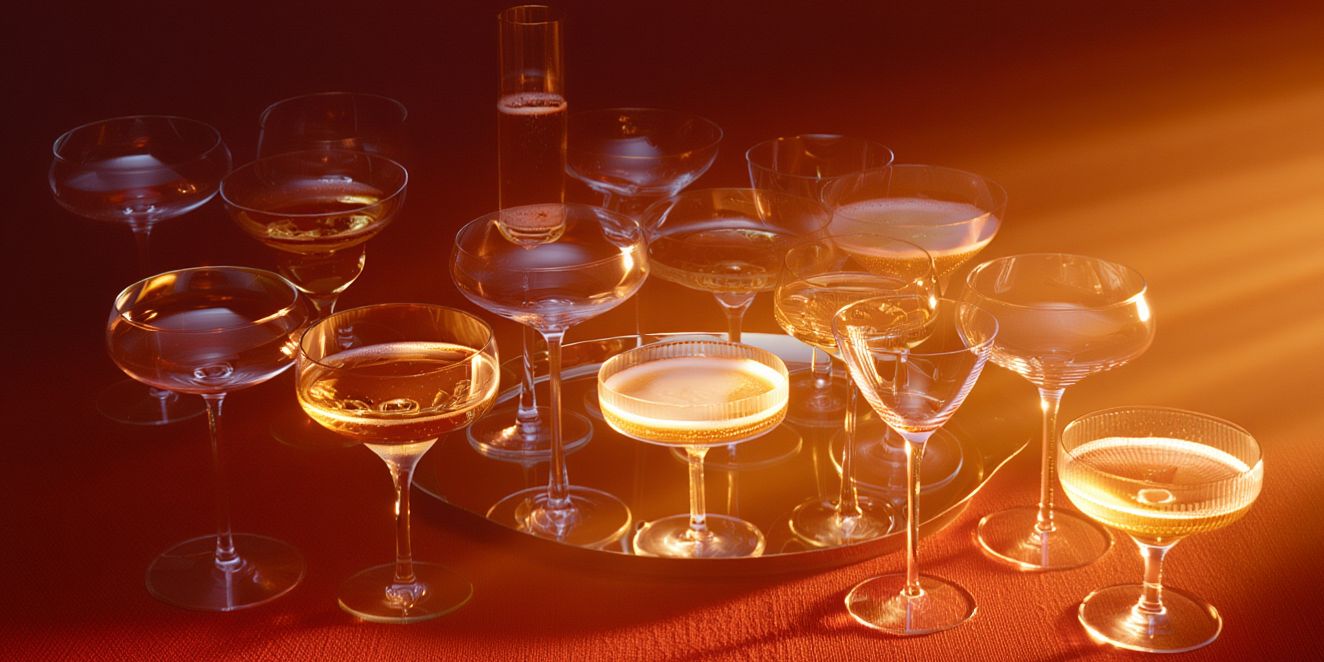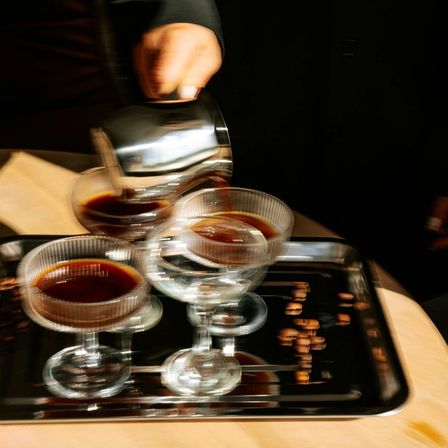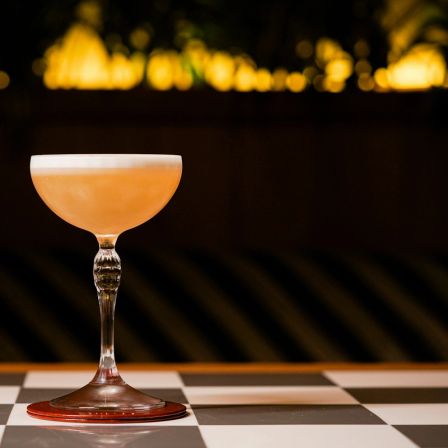- Lifestyle
Does your wine glass really make a difference? We asked four top sommeliers
Coupes, flutes, goldfish bowls, chalices: what we drink from matters. Except, of course, when it doesn’t…
- Words By Molly Steemson

There are two key strands to the wine-working universe. First, there are the vintage-dropping obsessives, who, hopelessly hypnotised by vinous glamour, endeavour to feed off its aura. Then there are the grafters, the sommeliers who work with wine to live; usually they pour. For this definitive guide to glassware without the guff, I chose to mine the latter.
Skilled sommeliers are empathetic, soulful people whose job it is to match wines with food and guide the customers based on their desires. Sommeliers form a vital link between the producer and the consumer. This is no poncey art, though there is a degree of magic to it: gifted sommeliers are obsessives; they know their wine offerings, and they know what to serve them in.
I canvassed the most gifted sommeliers in London on glassware. This lot are the real deal. Whilst there are far more pressing things to worry about in life than the cut of your stemware, it’s good to banish the bullshit and have it from the horses’ mouths.
Herein lies the definitive truth about glasses, as told by the finest sommeliers in the business.
Firstly, let's address the poncery. There are all kinds of dos and don’ts about glasses that have no real grounding in science. Unless you are some kind of mutant, the heat from your hands is unlikely to heat the wine through the glass. Glass is an insulator; the air temperature is far more influential. The most important thing about the vessel is its compatibility with smell and your personal enjoyment in drinking from it. Aroma does matter: if you stick a peg on your nose, you will not even be able to tell if the wine is white or red. A glass must, therefore, give good waft and direct the passage of liquid to the taste receptors in your mouth.
As much as 95% of what we define as taste actually comes from smell.
There are some genuine practical considerations for us to consider when selecting a drinking vessel. Chugging Buckfast direct from the bottle will not facilitate aromatic enjoyment. As much as 95% of what we define as taste actually comes from smell. Smell takes a dominant role in so much more than we realise. Consider that before we were capable of reason, we relied on our sense of smell to tell us what to eat, drink and even mate. Aesthetics matter, too: the way something looks defines a portion of its perceived value; eating and drinking are multi-sensory experiences. The best chefs and sommeliers know just how to play with this. Isa Bal:
Be chilled — but never use plastic…
Master Sommelier Isa Bal is simply one of the most respected sommeliers in the world. Every time I see him, he has acquired a new gong. He was mentored by the late Master Sommelier and Master of Wine, Gerard Basset, a man of humility who took great pleasure in making people comfortable. Isa and wonder-chef Jonny Lake own the peerless Bermondsey restaurant Trivet. They met working at The Fat Duck in Bray. Together, they have built a business that yields two mighty Michelin stars. For all this, Isa is an unpretentious, earthy dude who favours a modest, clunky, old-fashioned tumbler at home.
“The one thing I wouldn’t want to drink from is a plastic or paper cup,” says Isa. “It depends so much on the occasion. If you are hosting important business people, you want to use the finest stems to impress them. If you are being entertained by traditional people and they get out the cut crystal, I am very happy — it’s their house, and I could never scorn people for what glass they choose. I think it’s better to be chilled about the glass, as well as the wine.
If you are in a wine-focused place, people do expect you to have a certain type of glassware, but in a simple bistro, it's fine; it really depends on what the restaurant is like. In a two, three-star place, people expect to see fine glassware and bone china, but even that is changing; it’s becoming a lot more relaxed now than it used to be.
I think there is this image that certain glassware is acceptable as a sign of the highest quality and that is linked to the quality understanding of the restaurant. I don’t use Zalto [Zalto say they produce, ‘the most successful, handcrafted, functional wineglass on the market today.’ Few winos would disagree],but I use equally fine glass. For me glassware is all part of the fun: it’s about the ritual of sharing something beautiful. But I don’t let it keep me awake at night. Monique Ziervogel:
I draw the line at flutes…
South African Monique Ziervogel is the vivacious Head Sommelier at the gorgeous restaurant Spring — a fitting home for a woman whose life force springs from every pore. Ziervogel has a knack for making everyone comfortable: her lack of pretension is legendary. Spring is a beautiful space, a fresh white regency drawing room on the river at Embankment. Head Chef Sky Gyngell, formerly of Petersham Nurseries, is a genius as far as I’m concerned. The wine list is erudite and lively, much like Monique. Last time I went in they had Duncan Savage’s 2019 Restless River Chardonnay as their house white. So what does this illustrious mademoiselle of the wines choose to sup from at home?
“I have an aversion to throwing away all the chipped glasses from work so I drink from those and all the dribs and drabs I’ve collected over the years,” says Monique. “I’ve got sturdier glasses I use when I get people over for a braai. I find Chef & Sommelier brand tasting glasses work quite well for these big nights we have sometimes. I've got some random dusty little pub glasses from somewhere at the back of the cupboard and two very special Zaltos that are packed away. They make an appearance once in a while, but generally, as long as the glass rim is not a pub rim style, I honestly can’t complain about it. I mean, what’s more important? The perfect glass or the perfect temperature for wine?
I wouldn’t say I am a snob about glasses. It does make a difference drinking from a nasty thick-rimmed glass, but every other commercial glass out there, I think, is totally fantastic. You definitely don’t need a whole range of glasses at home. Any shape or size, I mix it all up. But I draw the line at flutes… Andres Ituarte:
I would never buy a coupe…
Andres Ituarte is the seriously impressive Head Sommelier at the newly minted Mandarin Oriental Mayfair, with Michelin-starred Head Chef Akira Back on food. The in-house restaurant will showcase Japanese and Korean cuisine. The opening is imminent. The wine list is highly eclectic with a fresh, new-world focus. Ituarte has been working flat-out twelve-hour days for weeks, yet he still made time to talk stemware with House of Decant.
Ituarte is kind of a big deal. The first time I encountered him was on a judging panel. Afterwards, we all went to the New Wave South Africa tasting, necessitating a stroll through central London. What happened next was like that running scene from Rocky II: from almost every restaurant Andres passed emerged a sommelier with a greeting, a handshake, some news, or a pat on the back. Mentorship is a huge part of being a sommelier, and Andres has really made his mark, which is pretty great to see. You start to comprehend why brilliant minds are attracted to 100-hour gruelling weeks without sunlight.
“My grandmother had these heavyweight etched lead crystal numbers that we were warned not to touch or even wash up,” says Andres. “They only came out of their silk-lined boxes on special occasions.
I really love a fine wine glass, but it's more about the tactile feel than anything. To pick up a glass and feel like air, touching something so weightless, so fine, that is what I like in a glass. But I think if you have a systematic approach to tasting wine, the vessel doesn’t really matter at the end of the day; you just need something that gets it to your mouth.
It's all about the occasion. If you are at your grandma’s house and she brings out those cut crystal glasses, it means something to her.
As for the coupe: they are a bit spilly and your Champagne goes flat so quickly. I don’t see the use for them, though the antique ones can feel sublime, and the Lehmann Paris coupe is a truly beautiful glass that feels gorgeous and stunning — but I would never buy it.
As for flutes, I like them. All the glasses have multiple functions, but a flute is purely for Champagne. There is something beautiful about that. I would much prefer to drink it in a white wine glass or a vintage Champagne glass, because that all gives you the bouquet and the aroma, but there is something lovely about a flute, and I have no issues with someone serving me a glass of Krug in one.” Merlin Ramos:
Some glassware can be too good…
Merlin Ramos, Head Sommelier and wine Buyer at Kioko by Endo, is a gifted painter and a true artist with a deep understanding of aesthetics. If he pours you a glass, you can be sure he’s done his homework first. He is the master of unearthing incredible beauties that the critics' scores have missed. He is febrile with poetic vinous knowledge: professionally precise. Of all the charming sommeliers in this piece, Merlin is undoubtedly the most aesthetically attuned. Does this extend to his glassware, too?
“I think it's situational,” begins Merlin. “If you go to the park with plastic Govino wine glasses, that’s a reasonably ok solution to a shit situation. It's better than drinking from the bottle. Having said that: I took my perfectly polished Spiegelau Definition Universals (RRP £28 per stem) in my bag to the park the other day.
You need to be able to adapt. A paper cup suffices when you’ve got lemonade, but for wine, the glassware affects your enjoyment of the drink. If someone has put so much effort into that drink, it's disrespectful to shove it in something crap. I prefer to drink sake in a wine glass too, because the swirl of the ethers contributes to your enjoyment of the aromatics. It's not traditional or right, but I think it’s better. Porridge tastes different with a metal spoon than if you eat it with a wooden spoon. It's really about the tactile sensation of the spoon in your mouth. The thinness of the glass alters the sensation you experience; it's everything, really.
On the flipside, some glassware can be too good. Some wines intensify in a Zalto in a very specific way, which can over-amplify certain facets of the wine, creating something unpleasant. If it's aromatic, it makes it very aromatic; if it's sharp and citrusy, it intensifies that — so there is a perfect glassware for accentuating a certain type of wine. I don’t think a universal glass is ideal; there are some wines that benefit from a big, weighty Barolo glass, and an open-top glass for an intense oaked Chardonnay from California is ideal. But not everyone has £20,000 to spend on glassware. It’s entirely situational. The universal glass becomes the next best thing. The glass should not be hot either.
I go to this village bar in the south of France with my dad where they literally have sawdust on the floor. You order wine and they pour you a very local, fantastic rosé in a tumbler, and that is exactly the right thing. Pulling out a Zalto there amidst the chaos, the music and the horse racing on full volume would just be weird. As Gouldner, the sociologist, said, context is everything. If you are at a party and someone hands you a great wine in a red cup with a white rim, it somehow works. One thing I will say is this: I can't stand flutes. A Riesling glass for Champagne is always best.”
Come on in the Chablis lovely, Your new home of drinks.
Stay up to date with all the latest from House Of Decant.





